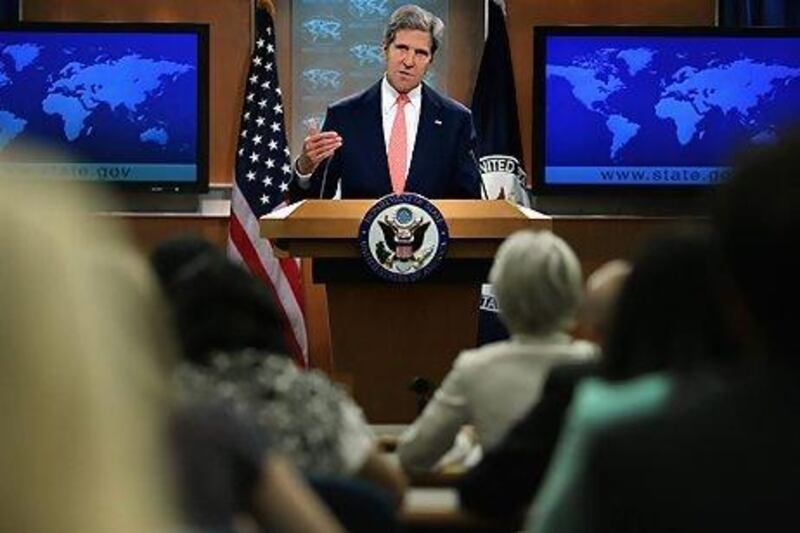NEW YORK // Limited US strikes against the regime of President Bashar Al Assad for its alleged use of chemical weapons could backfire and drag the United States deeper into a conflict it has sought to avoid for two years, analysts say.
US officials and their allies are weighing their military options after saying they believe that the Syrian government carried out the chemical attack on a suburb of Damascus last week that killed up to 1,300 people. But analysts have warned against the dangers of striking strategic targets in Syria, arguing that such action is unlikely to prove effective.
"Half measures are at best meaningless, at worst, counterproductive," said Christopher Harmer, a senior naval analyst at the Institute for the Study of War.
On Monday, John Kerry, the US secretary of state, outlined what could be a justification for the use of military force against Syria, but made it clear that Washington is narrowly focused on preventing the use of chemical weapons, not on bringing down the Assad government. "This international norm cannot be violated without consequences," Mr Kerry said.
If the US is now crossing the threshold of direct military intervention it has refused to breach for two years, "we should have a clearly defined strategic objective and enough force to accomplish it", Mr Harmer said.
Mr Al Assad, whose government considers the war an existential one, is unlikely to change his behaviour in the face of limited strikes, and may even step up the intensity of attacks against rebels and civilians in response.
To avert this, some analysts argued, the US must impose significant costs on Damascus through broader strikes that "hit at key political and military" locations and also follow through on previous pledges to arm moderate rebel factions, military analyst Anthony Cordesman wrote in a Center for Strategic and International Studies report on Monday.
But without placing direct military intervention within a framework that addresses the underlying regional political issues and helps create the groundwork for a diplomatic solution to the crisis, US action could provoke reactions that push its interests out of reach, according to the analysts.
"What's happening in Syria is a proxy war and therefore you have Iran and Saudi Arabia with very vested interests in the outcome," said Leila Hilal, a senior Middle East expert at the New America Foundation think tank in Washington. "And I don't think their interests will align in a way that will produce a political settlement just by hitting a few targets."
Military action without parallel diplomacy could provoke Iran at a time when there have been signs of a renewed push for negotiations over its nuclear programme. "While they've kept the nuclear negotiations separate from anything else happening in the region it could heighten hostilities," Ms Hilal said.
Strikes that come in a strategic vacuum without clear objectives may also embolden Mr Al Assad and his supporters and could result in an acceleration in violence against civilians, which could lead to a slippery slope for US involvement, the analysts said.
"Once you go down that road and establish Americans in the role of protecting human rights in Syria you've taken on a monstrous task for which there is no end," said Joshua Landis, a Syria expert at the University of Oklahoma.
Reacting in an ad hoc manner to further instances of chemical weapons use or other atrocities could draw the US into the conflict in a way that it has tried to avoid. If this hastens the fall of Al Assad's government it would bring about the worst case scenario from Washington's perspective: a power vacuum in which extremist rebels, already considered the strongest rebel groups, will control large swathes of territory and kill religious and ethnic minorities.
"There could be a power vacuum if the next steps are not planned for and anticipated," said Ms Hilal. "In that power vacuum the jihadist forces could ascend and take that place to even a larger degree."
Supporters of the limited strikes that appear to be the likeliest option have pointed to the Nato air campaign in 1999 against Yugoslavia. But Mr Landis said that the comparison is flawed because it involved the deployment of tens of thousands of ground troops, an option that even staunch proponents of US intervention do not support.
"How did we ultimately solve Yugoslavia? We sent in Nato forces; we cut it into several different states; we separated up the different warring factions that didn't want to live with each other and gave them their own nations."
tkhan@thenational.ae
twitter: For breaking news from the Gulf, the Middle East and around the globe follow The National World. Follow us





